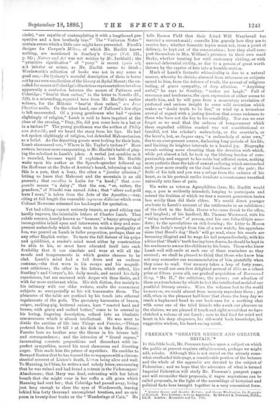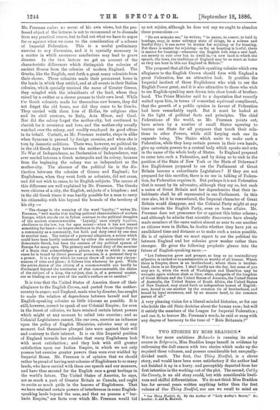FREEMAN'S "GREATER GREECE AND GREATER BRITAIN."
IN this little book, Mr. Freeman touches upon a subject on which the public at present requires enlightenment, perhaps we might add, rebuke. Although this is not stated on the already some- what overloaded title-page, a considerable portion of the lectures and the whole of the appendix are devoted to the subject of Federation ; and we hope that the advocates of what is termed Imperial Federation will study Mr. Freeman's pungent pages and will reconsider their proposals, if vague aspirations can be called proposals, in the light of the assemblage of historical and political facts here brought together in a very convenient form.
• G■eater Greece and Granter Britain; and George Washington, the Expander of England. Two Lecture'. with an Appendix. By Nthrara A. Freeman, D.O.L., LLD. London: Macmillan lad Co. 1583.
Mr. Freeman makes no secret of his own views, but the pro- fessed object of the lectures is not to recommend or to dissuade from any practical course, but to find out what we have to argue for or against when we come to the consideration of a scheme
of Imperial Federation. This is a useful preliminary exercise to any discussion, and it is specially necessary in a matter in which erroneous conclusions may lead to grave disaster. In the first lecture we get an account of the
characteristic differences which distinguish the colonies of ancient Greece from the colonies of modern England. The Greeks, like the English, sent forth a great many colonists from their shores. These colonists made their permanent home in the lands in which they settle3, and at all events in their Italian colonies, which specially received the name of Greater Greece, they mingled with the inhabitants of the land, whom they raised by a swifter or a slower process to their own level. While the Greek colonists made for themselves new homes, they did not forget the old home, nor did they cease to be Greeks. They carried with them love of Hellas, its religious rites and its civil customs, to Italy, Asia Minor, and Gaul. Nor did the colony forget the mother-city, but continued to cherish for it reverence and love, and the mother-city usually
watched over the colony, and readily -employed its good offices in its behalf. Corinth, as Mr. Freeman remarks, steps in alike
when Syracuse is pressed by foreign enemies, and when she is torn by domestic seditious. There was, however, no political tie in the old Greek days between the mother-city and its colony. No War of Independence, no Declaration of Independence, was ever needed between a Greek metropolis and its colony, because from the beginning the colony was as independent as the mother-city. The absence of the political tie is the dis- tinction betw een the colonies of Greece and England ; for Englishmen, when they went forth as colonists, did not cease, and did not wish to cease, to be English subjects. The causes of this difference are well explained by Mr. Freeman. The Greeks were citizens of a city, the English, subjects of a kingdom ; and in the old Greek times it was hardly possible for a man to carry his citizenship with him beyond the bounds of the territory of his city :—
" The change in the meaning of the word 'loyalty,'" writes Mr. Freeman, "well marks that leading political characteristic of modern Europe, which stands out in fullest contrast to the political thoughts of the ancient commonwealths. Loyalty,' once simply iega/itas, obedience to the law, has for ages meant—when it has not meant something far baser—no longer obedience to the law, no longer duty to a community as a community, but faith and duty owed by one man to another man. The notion of a personal allegiance, a notion which could have been hardly understood by either the aristocratic or the democratic Greek, has been the essence of the political system of Europe for many ages. The primary and formal duty of the member of a State that acknowledges a prince, a duty to which in many cases he is bound by direct personal promises, is a personal duty to a person. It is a duty which he cannot throw off under any circum- stances of time and place ; it follows him wherever he goes. While the active duties of the citizen of a commonwealth can hardly be discharged beyond the territories of that commonwealth, the duties of the subject of a king, the subject, that is, of a personal master, are as binding on one part of the earth's surface as on another."
It is true that the United States of America threw off their allegiance to the English Crown, and parted from the mother- country in auger; and England, made wise by disaster, has sought to make the relation of dependence between herself and her English-speaking colonies as little irksome as possible. It is still, however, correct to speak of our Colonial Empire; for even in the freest of colonies, we have retained certain latent powers which might at any moment be called into exercise ; and as Colonial Legislatures cannot, like our own, exercise an influence upon the policy of English Ministries, colonies may at any moment find themselves plunged into wars against their will and contrary to their interest. It is on this Imperial position of England towards her colonies that many Englishmen look with most satisfaction ; and they look with still greater satisfaction upon our Indian Empire, in which we not only possess but exercise greater powers than were ever wielded by Imperial Rome. Mr. Freeman is of opinion that we should rather be proud of having sent colonies of Englishmen to so many lands, who have carried with them our speech and our manners, and have thus secured for the English race a great heritage in the world's future. The United States of America, be says, are as much a part of Greater Britain as Canada, and ought to excite as much pride in the bosoms of Englishmen. That we have retained certain powers of interference in some English- speaking lands beyond the seas, and that we possess a" bar- baric Empire," are facts over which Mr. Freeman would bid
us not rejoice, although he does not say we ought to abandon these possessions :—
" Do not mistake me," he writes; "to annex, to coerce, to hold in bondage, may, in some unhappy state of things, be a solemn and fearful duty ; it can never be matter for rejoicing or for boasting. But there is matter for rejoicing—so far as boasting is lawful, there is matter for boasting—whenever the English folk wins a new land, not merely to rule over but to dwell in,—a new land in which the speech, the laws, the traditions of Eogland may be as much at home as they are here in this our England in Britain."
The proposal that all the English-speaking colonies which own allegiance to the English Crown should form with England a great Federation, has an attractive look. It gratifies the Imperial instinct of those Englishmen who wish to see the English Power great, and it is also attractive to those who wish to see English-speaking men drawn into close bonds of brother- hood. The Prime Minister said to a deputation that recently waited upon him, in terms of somewhat equivocal compliment, that the growth of a public opinion in favour of Federation had been remarkably rapid. But it must be looked at in the light of political facts and principles. The chief Federations of the world, as Mr. Freeman points out, have arisen by a number of small States agreeing to become one State for all purposes that touch their rela- tions to other Powers, while still keeping each one its separate being. The States which unite to make such a Federation, while they keep certain powers in their own hands, give up certain powers to a central body which speaks and acts in the name of the whole body of States. Is England prepared to enter into such a Federation, and by doing so to sink to the position of the State of New York or the State of Delaware P Are Englishmen prepared to see the Parliament of Great Britain become a subordinate Legislature ? If they are not prepared for this sacrifice, there is no use in talking of Federa- tion, for Federation requires it. But perhaps it is not Federation, that is meant by its advocates, although they say so, but such a union of Great Britain and her dependencies that their in- habitants shall be all represented in one Parliament. In this case also, let it be remembered, the Imperial character of Great Britain would disappear, and the Colonial Party might at any time outvote the English Party, even on home affairs. Mr. Freeman does not pronounce for or against this latter scheme ; and although he admits that scientific discoveries have already made members of the same nation almost as near to one another as citizens were in Hellas, he doubts whether they have yet so annihilated time and distance as to make such a union possible.
He is of opinion that we must expect to see the political tie between England and her colonies grow weaker rather than, stronger. He gives the following prophetic glance into the future of English-speaking races :—
"Let Federation grow and prosper, so long as no contradictory adjective is tacked on to a substantive so worthy of all honour. Where there is Empire, there is no brotherhood ; where there is brother- hood, there is no Empire. I shall hardly see the day, but some of yon may see it, when the work of Washington and Hamilton may be wrought again without slash or blow, when, alongside of the kingdom of Great Britain and the United States of A merica, the United States. of Australia, the United States of South Attica the United States of New Zealand, may stand forth as independent homes of English- men, bound to one another by the common tie of brotherhood, and bound by loyal reverence, and by no meaner bond, to the common parent of all."
A very pleasing vision for a liberal-minded historian, or for one who holds the old Stoic doctrine about the human race ; but will it satisfy the members of the League for Imperial Federation ; and can it, to borrow Mr. Freeman's words, be said or sung with any degree of harmony to the tune of "Rule Britannia ?"



































 Previous page
Previous page